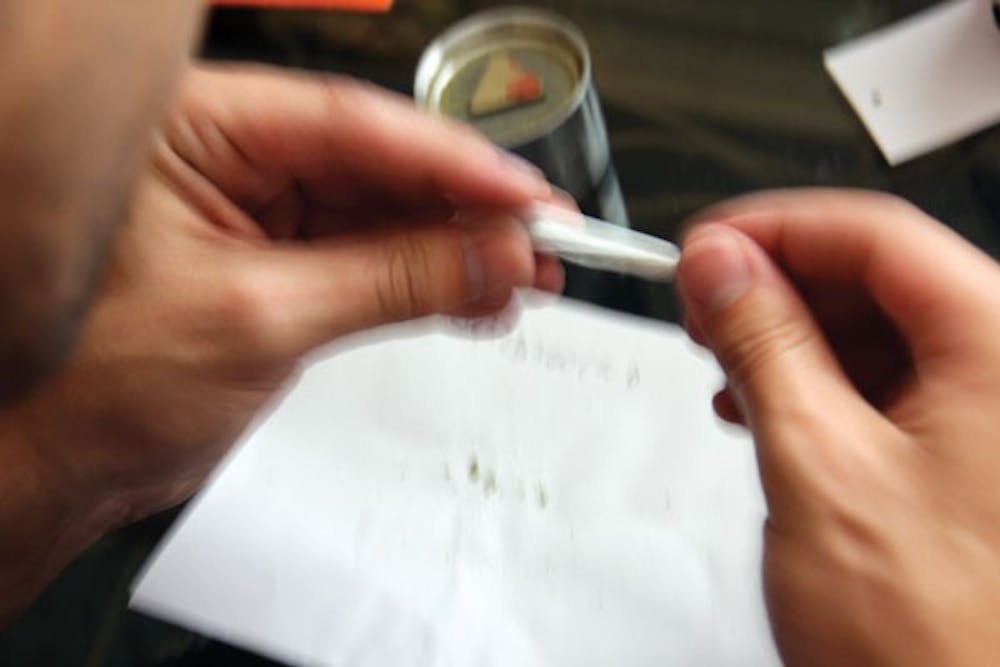The Arizona Department of Health Services announced Thursday that it was denying patient petitions to add depression, Post-Traumatic Stress Disorder, Generalized Anxiety Disorder and migraines to the list of conditions eligible for medical marijuana treatment.
In compliance with the Arizona Medical Marijuana Act, ADHS accepted patient petitions in January, held a public hearing in May and contacted the UA College of Public Health to review scientific studies and determine whether petitioned conditions would be effectively treated with medical marijuana.
After almost seven months of deliberation, ADHS Director Will Humble said in a blog post that his "guiding principle" in choosing to reject the petitions was based in scientific evidence.
ADHS will begin accepting new petitions to add conditions this week.
The Arizona Medical Marijuana Act, or Proposition 203, was approved by voters in November 2010. The Act allows patients suffering from "chronic" or "debilitating" conditions such as cancer, glaucoma, Crohn's disease or HIV to use medical marijuana as treatment.
The Act also implements a system of caregivers and dispensaries, regulated by ADHS, throughout the state to administer medical marijuana to medical marijuana card-holding patients. Gov. Jan Brewer challenged the Act in May 2011, two days before ADHS was to begin accepting dispensary applications. The lawsuit was dismissed by U.S. District Judge Susan Bolton Jan. 4.
In May, ADHS accepted applications from 486 prospective dispensary owners. The state has 126 Community Health Analysis Areas, each of which will be allowed one ADHS-certified dispensary.
While 99 of the areas had at least one dispensary applicant, 27 had no applicants at all. Between Tempe's two CHAAs, the city had 12-18 applications. ADHS will randomly select which applicant will be certified in each area on August 7, also called "Selection Tuesday."
ADHS Office of Inspection and Compliance Chief Harmony Duport said Estrella and North Tempe were the most popular locations for dispensaries in Maricopa County.
Butch Williams, a board of directors member for the Phoenix chapter of the National Organization for the Reform of Marijuana Laws, spoke at the public hearing for petitioned conditions in May.
Williams said the hearings involved extensive documentation of the benefits of medical marijuana on individuals with conditions such as PTSD, including studies done in Jerusalem.
He said Humble's decision to reject the petitions was "disheartening," but that he felt Humble had his hands tied with Arizona's conservative nature.
"I'm hoping in the future that we'll have more support from (Arizona) politicians and congressmen to allow a push for scientific studies to ensure what we have here is truly a medicine," Williams said. "It's a true medicine, and that is proven."
Medical marijuana patient and Gilbert resident Mychal Zito, 23, was first advised by his physician to apply for a medical marijuana card to treat chronic pain resulting from stomach ulcers and digestive problems, both of which caused excessive weight loss.
Zito said he disliked taking the pain pills he was originally prescribed because they would make him sick.
In addition to diminishing the pain of his chronic digestive problems, he said medicating has also significantly decreased his previously high anxiety levels.
Because of this, Zito said he hopes Humble reconsiders his decision to reject the recent condition petitions, which included a petition for anxiety disorders.
Zito said he is excited for dispensaries to be certified in August, as the presence of dispensaries will make the Arizona medical marijuana program more accessible to patients such as himself.
He said he currently receives medical marijuana through one of the few home delivery services available throughout the state.
"Having a dispensary will ... make me feel like I'm actually a patient," Zito said. "It'll be a lot easier for me to access my medication."
Reach the reporter at dgrobmei@asu.edu
Follow us on Twitter or like us on Facebook.





